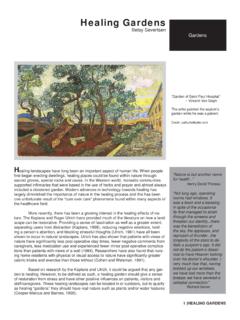Transcription of The impacts of nature experience on human cognitive ...
1 Ann. Acad. Sci. ISSN 0077-8923. A N N A L S O F T H E N E W Y O R K A C A D E M Y O F SC I E N C E S. Issue: The Year in Ecology and Conservation Biology The impacts of nature experience on human cognitive function and mental health Gregory N. Bratman,1 J. Paul Hamilton,2 and Gretchen C. Daily3. 1. Emmett Interdisciplinary Program in Environment and Resources, Stanford University, Stanford, California. 2 Department of Psychology, Stanford University, Stanford, California. 3 Department of Biology, Stanford University, Stanford, California Address for correspondence: Gregory N. Bratman, Emmett Interdisciplinary Program in Environment and Resources, 473 Via Ortega, Suite 226, Stanford University, Stanford, CA 94305. Scholars spanning a variety of disciplines have studied the ways in which contact with natural environments may impact human well-being. We review the effects of such nature experience on human cognitive function and mental health, synthesizing work from environmental psychology, urban planning, the medical literature, and landscape aesthetics.
2 We provide an overview of the prevailing explanatory theories of these effects, the ways in which exposure to nature has been considered, and the role that individuals' preferences for nature may play in the impact of the environment on psychological functioning. Drawing from the highly productive but disparate programs of research in this area, we conclude by proposing a system of categorization for different types of nature experience . We also outline key questions for future work, including further inquiry into which elements of the natural environment may have impacts on cognitive function and mental health; what the most effective type, duration, and frequency of contact may be; and what the possible neural mechanisms are that could be responsible for the documented effects. Keywords: ecosystem services; nature experiences; psychology; cognitive function; mental health from urban environments have in processing stress Introduction when compared to their rural For hundreds of years and across many cultures Beliefs about the role of nature experience in of the world, influential traditions in science, phi- mental health have played a role in the civic and losophy, poetry, and religion have emphasized the political discussions surrounding conservation for role that nature plays in providing feelings of well- a long time.
3 In the United States, for example, being. In the modern era of scientific enterprise, writers such as John Muir and the originators of a large body of work has demonstrated the impor- the Wilderness Act discussed nature 's contribu- tance of nature to human physical health, character- tions to mental health specifically, albeit qualita- izing the numerous ways in which people depend on This discourse extends well beyond wilder- the natural environment for security in the supply ness. In their work on the history of healing of food, water, energy, climate stability, and other gardens in hospital settings, Marcus and Barnes material ingredients of well-being. And now, in the trace the incorporation of restorative gardens and face of intensifying human impacts on the natural natural areas in infirmaries back to the Middle environment perhaps most visible in the form of Ages, referring to the nearly thousand-year old writ- land conversion, urban sprawl, and pollution of air ings of St.
4 Bernard that support the healing ef- and water researchers have begun to document the fects of these natural The authors follow importance of nature for mental functioning as well. these courtyard traditions in hospitals through For example, recent work has shown, though not yet the English, German, and French designs of the explained causally, the disadvantage that individuals 1600s 1800s. The benefits of natural areas were doi: 118 Ann. Acad. Sci. 1249 (2012) 118 136 . c 2012 New York Academy of Sciences. Bratman et al. nature experience , cognitive function, and mental health thought to span physiological and mental aspects effects of nature experience on cognitive function of well-being. Remnants of these traditions can and mental health. The first two, attention restora- still be found in the inclusion of Kur ( course of tion theory and stress reduction theory, stem from treatment involving nature walks, herbal reme- effects that may remain unrecognized to the individ- dies, and mud baths) in mainstream German ual, while the third, an idea that has its roots in the ,5 traditions of social psychology, relates to the me- The incorporation of nature into the estates of the diating effects of explicitly held preferences about rich is another example of the extent to which people nature .
5 Have been willing to invest resources in aesthetically We include studies that employ a particular set of pleasing landscapes throughout history. The reasons tools and approaches (traditional psychology tests, for this may vary from a display of power and con- surveys, and questionnaires) to quantify impacts trol over nature (as in the gardens of Versailles) to of nature experience on specific aspects of cogni- a sense of peace and enlightenment that these land- tive function and/or mental health (attention, con- scapes create in the mind of the Mod- centration, memory, impulse inhibition, stress, and ern environmental economics addresses the ways in mood). Using a snowball method, we began with which people are willing to pay for access to natural the work of Stephen and Rachel Kaplan that played landscapes, using travel cost methods, contingent a crucial role in establishing modern environmen- valuation, and hedonic studies of property values tal psychology19 as well as the work of Roger Ul- that embody a preference for nature in higher prices rich on the measurement of stress in individuals for places nearer to 13 But a central question re- as they respond to different From mains: why are some people willing to pay more for these groundbreaking and foundational studies, we contact with (or views of) nature ?
6 Worked forward by compiling the literature that Today, most people are experiencing significantly builds on them. Our search methods included min- lower levels of daily contact with nature as compared ing the references of these subsequent studies and to their parents' generation. One study estimates using computer search engines. We restrict the focus that the typical American now spends nearly 90% of our review to the benefits that fit under the the- of his or her life within This trend per- ories developed from these two strands of thought, meates most areas of the world. Many cultures with along with the additional exploration of the ways strong traditional ties to their surrounding natural in which preferences for nature may or may not environs have found themselves under the assault influence these particular benefits. Thus, our search of modernization, development, and environmen- brought us through much of the environmental psy- tal degradation, which have been tied conclusively chology literature, touching occasionally on studies to an increase in feelings of isolation and depres- that fall within the bounds of urban planning, med- sion within these 18 As we move ical research, and landscape aesthetics.
7 There is cur- into cities and indoors at an unprecedented rate, we rently exciting, interdisciplinary work underway on are faced with a rapid disconnection from the natu- broader aspects of cultural ecosystem services and ral world, and this opens a suite of critical questions relevant decision-making ,22. about repercussions for psychological well-being. nature Approach to the review Our analysis must begin with a clear notion of Here, we review the effects of nature experience on nature . In their biophilia hypothesis, Wilson and human cognitive function and mental health, syn- Kellert claim that we, as human beings, have an in- thesizing work from environmental psychology, ur- nate love for the natural world, universally felt by ban planning, medicine, and landscape aesthetics. all, and resulting at least in part from our genetic We provide an overview of the prevailing explana- make-up and evolutionary But what do tory theories of these effects, the ways in which ex- we mean when we speak of the natural world, or posure to nature itself has been considered, and the nature ?
8 These are clearly subjective terms. Studies role that individuals' preferences for nature may play have shown that most individuals consider the term in its impact on psychological functioning. Specifi- wilderness to consistently and generally apply to cally, we consider three possible explanations for the areas without discernible human ,24,25. Ann. Acad. Sci. 1249 (2012) 118 136 . c 2012 New York Academy of Sciences. 119. nature experience , cognitive function, and mental health Bratman et al. But wilderness is only one category from a broad aggregate of these studies and the lack of pertinent spectrum of gradients, and the degree or amount ecological details. of nature that a landscape contains can be cul- This work addresses crucial but relatively unex- turally or personally defined. Additionally, cultures plored questions about the particular elements of and individuals differ with respect to what are con- nature that impact the human psyche.
9 At a min- sidered to be the attractive and natural components imum, it would be most informative were the re- of search to specify the types of environments used in The definition of what makes an environment experiments in some detail, using modern quan- natural changes across time, space, and the indi- titative methods at multiple scales. Ideally, further vidual engaged in the defining. Debates span the hu- research would seek to understand and define what manities and natural sciences over whether nature is the natural components of these landscapes are a social construction or if it exists on its own in an in- that act as input for psychological mechanisms. This dependent and constant ,28 We cannot look would lead to a more coherent and thorough set of to science for an impartial or consistent answer to postulates about which particular aspects of nature this question. Objective classifications from satel- may have impacts on cognitive function and mental lite data have been shown to differ from individu- health and ultimately, what the causal pathways als' assessments of environmental qualities and de- are for these effects.
10 Scriptions of areas in the same Philosophical debates over the human definition and representa- The nexus of nature experience and cognitive tion of nature are numerous and complicated, and a function and mental health summary of them is beyond the scope of this paper, We examine studies that have attempted to docu- but we briefly discuss some key issues below. ment the psychological impacts of nature experience Most studies included in this review use compar- in a scientifically rigorous way. Many of us have ex- ative approaches in which the experience of individ- perienced an emotional fulfillment from viewing . uals within one environment is contrasted with that or being physically present within natural envi- of individuals within another, where one environ- ronments. And on an instinctual level, many of us ment is clearly more natural, within the context can also relate to Kellert and Wilson's hypothesis that of the study ( , tree-lined city streets vs.)







